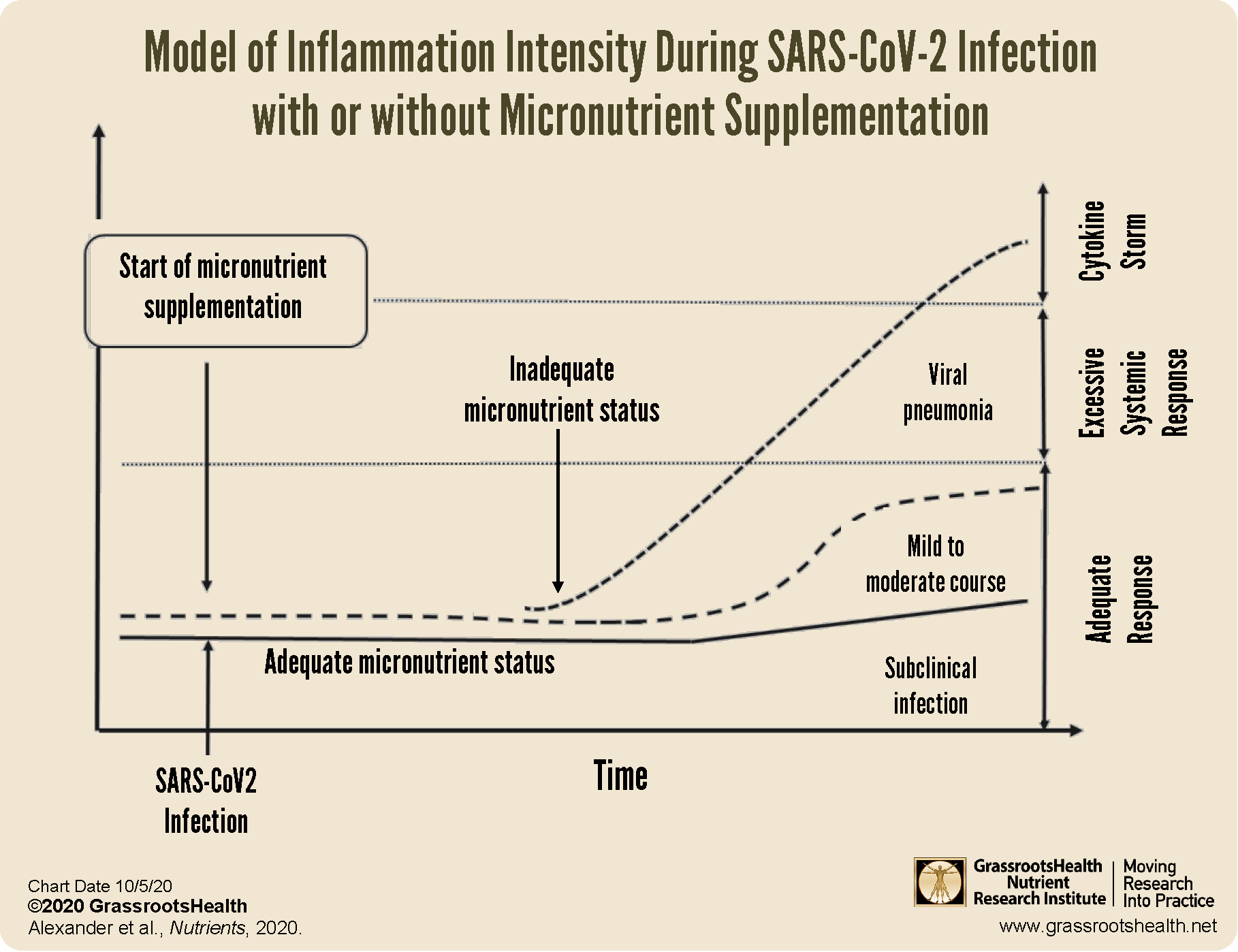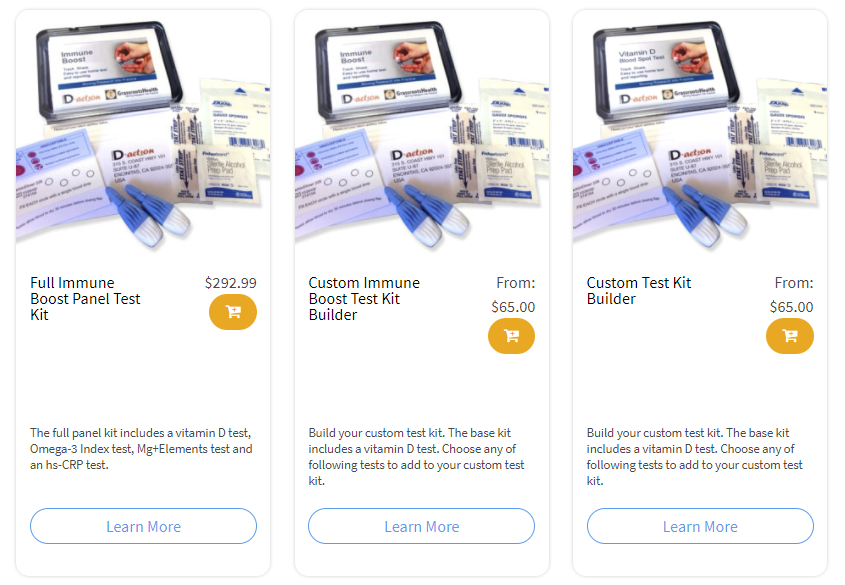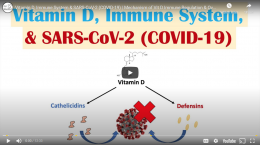Published on October 7, 2020
Deficiencies in zinc, selenium, and vitamin D may lead to improper immune and inflammatory response to viral infections
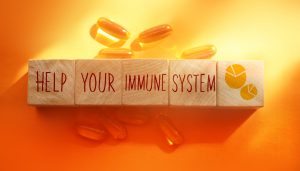 Severe COVID-19 is associated with excessive activation of the innate immune system, leading to uncontrolled inflammation and the resulting cytokine storm. Certain nutrients, such as zinc, selenium, and vitamin D, are known to play a role in reducing inflammation and regulating the immune response. Deficiencies in these nutrients are known to impair immune function and also contribute to certain age-related diseases, such as diabetes, hypertension, and coronary heart disease, each of which are known risk factors for severe COVID-19.
Severe COVID-19 is associated with excessive activation of the innate immune system, leading to uncontrolled inflammation and the resulting cytokine storm. Certain nutrients, such as zinc, selenium, and vitamin D, are known to play a role in reducing inflammation and regulating the immune response. Deficiencies in these nutrients are known to impair immune function and also contribute to certain age-related diseases, such as diabetes, hypertension, and coronary heart disease, each of which are known risk factors for severe COVID-19.
Avoid Nutrient Deficiency Before Exposure
Ensuring adequate micronutrient status well before exposure may lessen both the chance of infection as well as the chance of severe symptoms and death. This has been demonstrated by multiple studies where vitamin D supplementation and/or status is evaluated along with disease progression. The figure below illustrates the different theoretical paths of disease progression based on
i) adequate micronutrient status at the time of infection,
ii) correction of micronutrient inadequacy through supplementation at the time of infection, and
iii) micronutrient inadequacy for the duration of infection.
Zinc, Selenium and Vitamin D May Protect Against SARS-CoV-2 and COVID-19 Disease Progression
A review by Alexander et al. titled Early Nutritional Interventions with Zinc, Selenium and Vitamin D for Raising Anti-Viral Resistance Against Progressive COVID-19 looked at current research and clinical data on the roles of zinc, selenium, and vitamin D within the immune system in response to viral infections of the lungs, and their potential impact on susceptibility to COVID-19. Below is a summary of the roles of each of these nutrients within our immune response, and how deficiency may hinder the effectiveness of that response.
Zinc
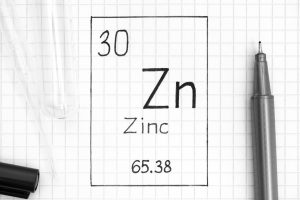 Zinc is a nutrient known to benefit the immune system, and deficiency of zinc impairs the capacity of many different immune cells to carry out their functions. Studies have shown that zinc may reduce the risk and duration of infections such as pneumonia, the common cold, and the flu, especially in children and the elderly. Zinc plays a central role in T cell-mediated function and immune response to infectious disease, and improvement in zinc levels may lead to increased T cell count. In summary, zinc:
Zinc is a nutrient known to benefit the immune system, and deficiency of zinc impairs the capacity of many different immune cells to carry out their functions. Studies have shown that zinc may reduce the risk and duration of infections such as pneumonia, the common cold, and the flu, especially in children and the elderly. Zinc plays a central role in T cell-mediated function and immune response to infectious disease, and improvement in zinc levels may lead to increased T cell count. In summary, zinc:
- Is important for the development and maintenance of immune cells
- Is especially necessary for T-cell function
- Deficiency results in dysfunctional immunity and has been associated with increased levels of inflammation
- Has the potential to inhibit viral replication and reduce duration of illness due to viral infections
Selenium
 Selenium is involved in T cell proliferation and antibody production, and it influences the production of cytokines and eicosanoids — chemical messengers that regulate inflammation and immune cell function. Selenium deficiency has been known to increase the severity of certain viruses during infection, and a sufficient level of selenium has a protective role within the respiratory system especially.
Selenium is involved in T cell proliferation and antibody production, and it influences the production of cytokines and eicosanoids — chemical messengers that regulate inflammation and immune cell function. Selenium deficiency has been known to increase the severity of certain viruses during infection, and a sufficient level of selenium has a protective role within the respiratory system especially.
Selenium is an integral component of two antioxidant enzymes, glutathione peroxidase and thioredoxin reductase, both of which protect immune cells from oxidative damage. Glutathione Peroxidase1 (GPX1) is a selenium dependent enzyme that has been observed to inhibit the replication of the SARS-CoV-2 virus. In fact, a recent study found significant correlations between the cure rate for COVID-19 and selenium status within particular regions of China, indicating that higher levels of selenium led to improvement in COVID-19 outcome.
Vitamin D
 The role of Vitamin D within the immune system and how it affects upper respiratory infections in general, as well as COVID-19 outcome, has been covered extensively in previous posts. Vitamin D is needed for the production of antibacterial proteins (cathelicidin and defensins) and has many effects on adaptive immunity including shifts in T cell populations, cytokine and antibody production and influences on phagocyte responses. For a list of recently reviewed studies on vitamin D and COVID-19, immune system function, and more, view the summary page here.
The role of Vitamin D within the immune system and how it affects upper respiratory infections in general, as well as COVID-19 outcome, has been covered extensively in previous posts. Vitamin D is needed for the production of antibacterial proteins (cathelicidin and defensins) and has many effects on adaptive immunity including shifts in T cell populations, cytokine and antibody production and influences on phagocyte responses. For a list of recently reviewed studies on vitamin D and COVID-19, immune system function, and more, view the summary page here.
Measure Your Vitamin D, Zinc and Selenium Status
As Alexander et al. states in their review,
“…nutritive supplements administered at an early stage of the infection were important for enhancing host resistance against RNA viral infections, which might also include severe COVID-19.”
This is particularly important for preventing excessive inflammation and the cytokine storm.
Start by measuring your micronutrient status today – the Vitamin D PLUS Essential Elements test kit includes a home blood spot test for vitamin D, magnesium, selenium, zinc, copper, and toxic elements mercury, lead and cadmium. When you know what your status is, you can then determine if and how much supplementation may be needed.
See if your immune system might be needing more of each of these nutrients, and take action to avoid deficiency! You can also enroll with the Full Immune Boost Panel (which includes tests for vitamin D, Omega-3 Index, magnesium, zinc, selenium, copper, and hsCRP), and get 10% off when you use coupon code BoostTen at checkout.
What Does it Take YOU to Get Your D to 40 ng/ml (100 nmol/L)?
Did you know your health could be greatly affected by making sure you have a vitamin D level of at least 40 ng/ml (100 nmol/L)? Help us help you.
STEP 1 – Do you know what your vitamin D level is? If not, be sure to test today to find out.
STEP 2 – Determine your target level. Are you at your target level? Experts recommend a level of at least 40-60 ng/ml (100-150 nmol/L).
STEP 3 – Need to boost your level? Use the D*calculator to see how much vitamin D it may take to reach your target. Opt for the Loading Dose for a quicker boost.
STEP 4 – Optimize how your body absorbs and utilizes vitamin D with co-nutrients and these simple steps.
STEP 5 – Re-Test! This is an important step to make sure you have reached your target level, and to ensure you are not taking too much! Re-testing after 3-4 months is recommended.
STEP 6 – Adjust, Repeat…
Give your immune system the nutrients it needs to support a healthy you and protect yourself from unnecessary diseases, especially COVID-19.
NEWS ALERT
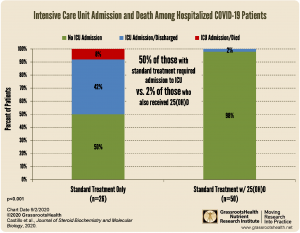 The first Randomized Controlled Trial on vitamin D and COVID-19 has shown a 96% lower risk of ICU admission for those receiving vitamin D (as 25(OH)D to quickly boost vitamin D blood levels) along with the standard treatment, compared to those receiving standard treatment alone.
The first Randomized Controlled Trial on vitamin D and COVID-19 has shown a 96% lower risk of ICU admission for those receiving vitamin D (as 25(OH)D to quickly boost vitamin D blood levels) along with the standard treatment, compared to those receiving standard treatment alone.
These results support many previous observational studies showing a relationship between vitamin D levels and intake and COVID-19 severity.
Review the Latest Nutrient Research for COVID-19
GrassrootsHealth Nutrient Research Institute has launched the new Immune Boost project with the use of our myData-myAnswers nutrient health system that nearly 15,000 people are already using for their health. Specific markers that influence immune health are suggested for testing as part of this project including:
- Vitamin D
- Omega-3 Index
- Essential elements magnesium, selenium, and zinc
- hsCRP
Our goal is to demonstrate how one can use the Nutrient Research Model established by Dr. Robert Heaney to show the effect of vitamin D serum levels of at least 40 ng/ml (100 nmol/L) on risk reduction for all ethnicities in the population. Status and intake of other nutrients will also be analyzed for any type of relationship to immune status and symptom severity. Join the project today!
Please let us know if you’re interested in helping sponsor this project.
CLICK HERE for updates and new information about the project.
Through GrassrootsHealth Nutrient Research Institute, you can also test your essential elements magnesium, copper, zinc and selenium, toxins such as lead, mercury and cadmium, as well as your omega-3 levels, inflammation levels and thyroid stimulating hormone (TSH) level. Find out your levels today! Log on to the test selection page (click the link below) to get your tests and see for yourself if your levels can be improved.
Make sure you track your results before and after, about every 6 months!
Click Here to Access the Test Page
How can I track my nutrient intake and levels over time?
To help you track your supplement use and nutrient levels, GrassrootsHealth has created the Personal Health Nutrient Decision System called
For each specific supplement, you can track what days you take it, how much, and many other details. This will help you know your true supplemental intake and what patterns of use work for you to reach and maintain optimum nutrient levels. Check it out today!


